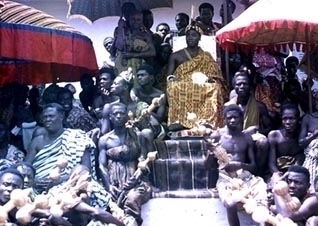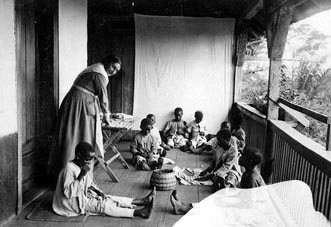Translations:
Other Pages:
CEC Training Modules
Akan Studies Site Map
Sociology for beginners
Contact
Kompan Adepa
Go to the People
Ghana Web
African and European Law in Ghana
by Phil Bartle, PhD
Presented to the African Law Students
University of Victoria
In the context of Black History Month
History is usually written by the winners.
There is much misinformation written about Africa and Africans, some from ignorance, some racism, some romantic invention, some spin. The response to this should not be the invention of an ideal Africa (as in the movie “Coming to America”) but should be the recording of verifiable facts.
For each event recorded as history, there can be over a billion events not recorded. It becomes an issue of choice for which events to record. This is a spin doctor’s dream. The history I was taught in the forties and fifties was derived from the British Empire. Whatever truth it contained, it conveniently left out events not favourable to its reputation. I did not learn then, for example about the gifts of free blankets given to First Nations people, gifts infected with smallpox. British attempts at aboriginal genocide, including the destruction of the prairie bison, reduced the population to ten percent of what it had been.
The history we were taught included the addition of the Ashanti Empire to the British Empire in 1901. It did not mention that the British and Ashanti fought seven wars in the nineteenth century and the British lost them all. Only when they introduced the Gatlin gun could Garnet Wolseley defeat the Ashanti in the rain forest of what is now Ghana.
Not only is history biased in favour of the winners, the marketing of international NGOs, based upon liberal guilt, depicts Africa as if it is helpless and pathetic, fit only for wars and starvation, and thus in dire need of our charity. That very charity weakens the beneficiaries, encouraging governmental corruption and the attitude of dependency where people wait for more charity rather than helping themselves. It does not include the large number of contributions of Sub Saharan Africa to the rest of the world, starting with the culture of early dynasty Egypt, which was black, and which informed our classical Greek and Roman cultural fore runners.
I will talk today about African and European Law, a mix of which is practised today in Ghana. I do so in the context of Black History month (February, 2007), the reason for this address.
To understand historical law among the Akan, the dominant language and culture of Ghana, it is important to understand matriliny. Matriliny is a basis of social organization that is quite different from mainstream Canadian, British based, social organization.
 |
Matriliny is first about the formation of corporate descent groups.
Everybody belongs to a matrilineage; the same one as her or his mother. No one may belong to the same lineage as her or his father or spouse. This is not at all the same as a “family” in the European sense. The size of each corporation varies, but let us assume an effective size is about three or four hundred persons. It is not communal or equalitarian, there is inequality of power, prestige and wealth within it.
In European aristocracy, succession was defined, usually as the first male child of the deceased. (It is changing, but not towards the Akan model). If a king or duke died, his eldest son became king or duke. In Akan matriliny, it is not automatic. If a chief or elder dies, the office is owned by the lineage as a corporation. The lineage then chooses the best person to become the new chief or elder.
Again, European inheritance was like its succession; set rules favouring the eldest son. In Akan matriliny, again in contrast, the descent group inherits the wealth of the deceased, and may allocate its usage, eg living in a house, to various members. The spouse of the deceased is not a member of the lineage, and does not inherit. Children of the deceased, if he is male, do not inherit. Even if the deceased has made a will giving the wealth to the spouse, the lineage will usually dispute the will, and usually win possession, in both chiefs’ courts and magistrates’ courts. Except in cities, where land can be alienated and bought and sold, the Law of Ghana supports the corporate descent group ownership of land. This is also true for minority ethnic groups such as the Ga-Adangbe and Ewe, who practice patrilineal descent.
Being first born is not an advantage in Akan society. Third born is preferred. If an individual is first born of one parent and third born of the other, they will emphasize the third born and the individual will take the name Mensah (m) or Mansah (f) meaning third born.
The rain forest in what is now Ghana was mainly populated by the patrilineal Guan, who formed loose federations, if any, of patrilineages. The Akan expanded, from 700 to 1400 ce (ad) because of their matrilineal descent, and because it allowed for a unique form of confederation in contrast to the earlier Guan. The reason for this is that matriliny is not the mirror image of patriliny, and women remained members of their lineages after marriage.
In a chief’s court, the chief is considered the “husband” of each of the elders in the court. Each elder, like the chief, is representative of a different matrilineage. The confederation is symbolized and strengthened by each lineage providing a wife to the chief. When the wife dies, she is replaced by her lineage. When a chief dies, the new chief inherits all the wives for each of the lineages.
Each of the elders in the chief’s court represents a military body, where the matrilineage is deployed in a military fashion. One is for the vanguard, another the rear guard, another the left guard, another the right guard, then several with specific functions for time of war.
That arrangement, like a hockey team or soccer team, meant a more effective military force, and contributed to the Akan success in the rain forest, and their winning of all the wars against the British in the nineteenth century.
Each lineage owns an office in the chief’s court, and fill it, usually with men. Women are not barred from office, but can not go into the sacred ancestral stool rooms during menstruation, so women tend to be past menopause before taking such office. Women exercise considerable power in the running of the affairs of the lineage, however; especially older women. The parallel I find useful is that of a radio announcer or film actor, where the producer sits in the background and has much decision making power while the radio host or actor is much in the public spotlight.
Historically, the chief’s court was the vehicle for settling disputes. With the addition of British law and legal institutions, most criminal cases are transferred to magistrates’ courts. The last execution in Kwawu was before it declared independence from Ashanti and became a Protectorate in 1883. Chief’s courts still handle most civil disputes about marriage, descent and land. A party to a chief’s court case has the right to transfer the case to a magistrate’s court, but most prefer the chief’s court because of familiarity, lower costs, and ease of access. Some lawyers easily move back and forth between chiefs’ courts and magistrates’ courts. The paramount chief of Kwawu, when I did my research in the sixties and seventies, Dasabre Akuamoa Boateng, practised law in Tema near the capital city. The Obo chief who inherited me, Nana Asiamah II, had been a police sergeant prior to being elected as chief.
When explaining the functioning of power and decision making in a chief’s court, an elder may hold up her or his hand. The central, longest, finger represents the chief. The two on either side will be vanguard and rear guard, and the thumb and pinkie the left and right guard chiefs.
 |
Speaking through one of the linguists (because the chief and elders are seen as possessed by their own ancestors and therefore sacred), a complainant will present a case to the right or left side of the court, usually whichever is more closely related. The defendant will present to the other side. Each elder will stand and make a case or argument one side and the other in turn. As each elder speaks, the argument tends to be more of a compromise, until the last person to speak will be the chief. The chief does not make unilateral arbitrary judgements; he or she makes a decision based upon the compromises made by each of the elders as they speak. The final decision is thus a consensus, and is sanctioned by the spiritual agreement of the ancestors.
This can happen at a village level or up the hierarchy of the state. At each level, if no satisfactory decision is made, the complainant or defendant can move the case to a higher level of chief’s court. Each level of court is more expensive, because more sheep have to be sacrificed and more expensive alcohol provided.
When a case in a chief’s court gets sticky, or bogged down for lack of genealogical information, the court will break and the leaders will say they will consult with the ancestors. Many of the elders will go to their lineage homes and have a meal, because they sit long hours from dawn with nothing but schnapps (for libations) to sustain them. At the lineage houses, some will consult with the old women of the lineage, who usually have a more detailed knowledge about descent lines and relationships. In this way the old women remain in the background, but can wield considerable political influence
Here is an example. In the past a man may have had a female slave and fathered a child. Slavery was practised long before the Atlantic slave trade, and slavery was not the inhumane oppressive institution that the Europeans made of it in the Western hemisphere. As in ancient Greece or Egypt, a slave could attain high status, rather equivalent to permanent secretary or, as in Canada, deputy minister. The child, then, of a female slave, would be brought into the matrilineage of a descent group, along with all her offspring through female lines of descent. Members of that section of the lineage are not supposed to be elected to high positions such as elder or chief. Since it is forbidden to ask if someone is slave status, and certainly not permitted to say that someone is of slave status, the elders may not have a clear idea of a person’s status. When the elders break to consult with the ancestors, some of them will be asking their mothers and aunties about the status of someone key to the case, and the answer will influence the court case. Often, out of expedience, a person of slave status will be put in a position of office because there are no available non slaves. Only the old women know. Later, when a non slave person becomes available, they will let the male elders know, and there is a change in a later decision. The old women wield power by their secrets and advice to the elders.
This kind of flexibility can not be practised in a magistrate’s court.
Matriliny (a way of determining descent) is not matriarchy (automatic power to women). As practised by the Akan, however, matriliny allows for a hidden form of power to old women, and the term we use is “Covert Gynocracy.”
Furthermore, since women are important in the continuation of the lineage, women tend to be independent of control by their fathers or husbands. In comparison with societies in Europe and the Middle East, Akan women had much power and independence, and had their own sources of wealth from trading and farming.
When the Swiss missionaries came to the Gold Coast in the nineteenth century, they had a goal far more than teaching the theology of Christianity. They wanted nothing less than the removal of chieftaincy, abolition of ancestor homage, and the destruction of matriliny.
 |
Westernization, to some extent, therefore meant the lowering of the status of women for the Akan.
Matriliny, however, is very strong. It is practised today by the descendants of runaway slaves in the Caribbean and Surinam. It continues in Ghana and is supported by laws that honour the historical methods of allocating land, which in Akan areas means chieftaincy and matriliny. In spite of heavy proselytizing of Christian missionaries, and a desire to imitate the West, matriliny continues, along with chieftaincy, and the hidden power of women.
While there is much inaccurate information about the history of Africa, it needs to be counteracted by more research and the propagation of the positive contributions of Africa and Africans, and a better understanding of African cultures and societies.